The transition of the UK’s vehicle parc to electric is throwing up significant challenges to all players in the UK transport industry, whether they are vehicle manufacturer, supplier or fleet decision-maker.
Among those most challenged are the oil companies, who face a steady decline in revenue unless they can adapt to meet the demands of the changing market.
This is complicated further by the arrival of newer, innovative companies such as Instavolt and Gridserve, who have been set up specifically to offer charging solutions to the new wave of electric vehicles (EVs) without any legacy business to potentially hold them back.
However, BP – the UK’s largest fuel retailer with more than 1,200 filling stations – is fighting back and has pledged to become an integrated energy company by 2030 before becoming net zero emission by 2050.
A key part of this transformation plan is its aim to build the biggest and most reliable network of ultra-fast chargers across the UK, as well as meet all charging needs for both fleets and private motorists.
“We feel a sense of responsibility that comes with the size of the business of the BP brand,” says Matteo de Renzi, CEO of BP Pulse.
“If you look at the actions we are taking, we are really moving towards becoming an integrated energy company, not an international oil company.”
CEO Matteo de Renzi outlines integrated energy strategy.
The transition of the UK’s vehicle parc to electric is throwing up significant challenges to all players in the UK transport industry, whether they are vehicle manufacturer, supplier or fleet decision-maker.
Among those most challenged are the oil companies, who face a steady decline in revenue unless they can adapt to meet the demands of the changing market.
This is complicated further by the arrival of newer, innovative companies such as Instavolt and Gridserve, who have been set up specifically to offer charging solutions to the new wave of electric vehicles (EVs) without any legacy business to potentially hold them back.
However, BP – the UK’s largest fuel retailer with more than 1,200 filling stations – is fighting back and has pledged to become an integrated energy company by 2030 before becoming net zero emission by 2050.
A key part of this transformation plan is its aim to build the biggest and most reliable network of ultra-fast chargers across the UK, as well as meet all charging needs for both fleets and private motorists.
“We feel a sense of responsibility that comes with the size of the business of the BP brand,” says Matteo de Renzi, CEO of BP Pulse.
“If you look at the actions we are taking, we are really moving towards becoming an integrated energy company, not an international oil company.”
Matteo De Renzi
BP made its first significant inroad in the UK’s EV charging sector in 2018 when it acquired Chargemaster and its Polar network for a reported £130 million.
This gave it the UK’s largest public charging network of 6,500 charge points which has since grown to around 8,000, with more than 63,000 home and workplace units also installed.
The company, which had been known as BP Chargemaster since the acquisition but was rebranded to BP Pulse in December, plans to increase this to 16,000 by 2030, including 1,400 ultra-fast chargers with a power output greater than 150MW. It aims to have 300 of these by the end of the year.
Its existing fuel forecourts have a key role to play in this expansion. “Not only do we have preferential access to the land, of course, but we can leverage from the broader BP agreements in terms of electricity,” says De Renzi.
“But the most important thing is really around the user experience. Forecourts are where they are today for a reason as they come after the process of natural selection over almost 100 years.
“The fact you can go to an ultra-fast charger in a very convenient location is one of the most appreciated features of our offer.
“Users also have the opportunity to enjoy the convenience offer which is literally a few metres away and is manned 24/7. This is particularly important when you start thinking about more vulnerable customers.
“Spending 10 to 15 minutes in your car behind a hotel in a dark corner is not always a great experience. You’d rather spend that time under a bright canopy where you feel safe.”
Charging hubs
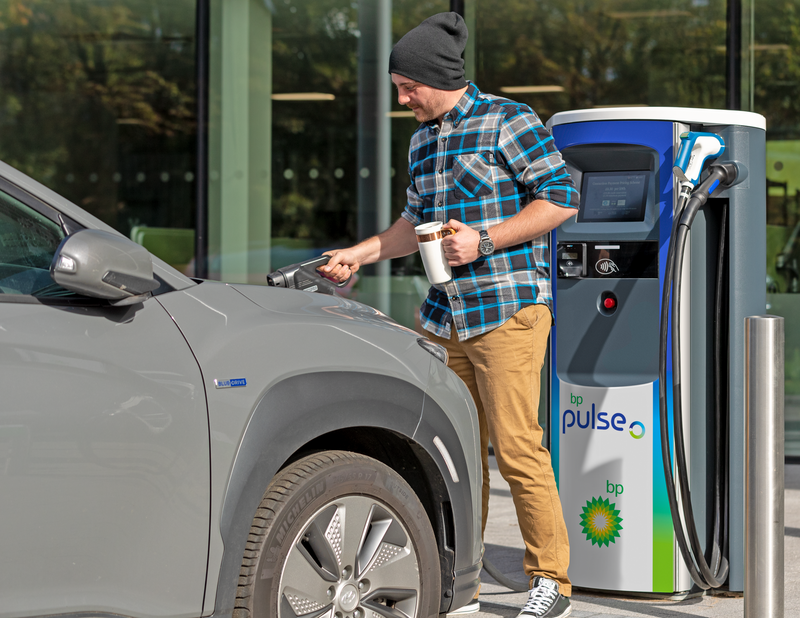
As well as installing ultra-fast chargers on existing fuel forecourts, De Renzi says BP Pulse is also building charging hubs “mainly for fleets, but also the general public”.
This initiative began with a partnership with Uber in London which saw a hub open in Park Lane.
Its location was determined using data from the Uber platform to understand where drivers want to be when they need to charge, says De Renzi.
“A few other hubs will follow in London and in the rest of the country,” he adds. “This is a great model because it allows us to offer a solution for a problem that exists – a lack of ultra-fast charging infrastructure in specific locations – but, equally, it’s great for us because it gives us an almost guaranteed demand from day one.
“This is one of the biggest challenges we have in building infrastructure ahead of the curve because, although demand is ramping up very fast, today the assets are still under-utilised.
“We are extending this model to other big mobility providers and other fleets will also be able to benefit from these big charging hubs with preferential access and rates.”
BP Pulse, which had the most used public charging network in the UK last year, powering around 50 million miles, has also made £2m available to upgrade and replace existing charge points across the country.
It has already agreed more than £400,000 in infrastructure investment to replace more than 50 legacy charge points which are typically owned by local authorities and were originally installed with Government grant funding.
BP Pulse has also signed an exclusive memo-randum of understanding (MOU) with American company FreeWire Technologies to deploy its Boost Charger in the UK.
This technology features a 160kWh lithium-ion battery which charges from a low-power grid connection and is then able to act as an ultra-fast EV charger when needed.
“FreeWire is one of those beautiful products which is very easy to explain, but extremely difficult to put together,” says De Renzi.
“It allows charging up to 120kW, which is almost the same you could experience on an ultra-fast charger on the rest of our network, but without the need of a very complex and expensive high voltage connection.
“This means that even the more rural areas, or the areas where it would be difficult to deliver high power to, will be able to enjoy their own ultra-fast charging points with a non-invasive solution.”
The first FreeWire charge point has been installed outside BP Pulse’s office in Milton Keynes although it is not open to the general public yet.
The company aims to have the first unit installed and available to the public in Q3 or Q4 this year and then significantly ramp up provision of the solution from 2022 onwards.
Meeting demand
According to Zap Map, there are around 23,000 public charge points in the UK and there has been much debate around how many will be needed by 2030, when the sale of new conventional petrol and diesel cars and vans is due to be banned.
Influential think-tank the Policy Exchange earlier this year said the country will need 400,000, but De Renzi disagrees.
“We should acknowledge the fact that we already have an impressive number of charge points across the country which are not utilised enough.”
Matteo De Renzi
“We see a strong shift from traditional low power AC charging towards the rapid and ultra-fast solution which better fits the needs of the driver in the day.
“If you look at our ultra-fast chargers which we believe will become the real workhorse of our fleet, their time utilisation (the amount of time someone is using them) is 15% or 16%.
“In terms of the amount of power they dispense in a day compared with the total power they could, it is 4% or 5%.
“This is because the infrastructure is so much ahead of the cars’ ability to taken on that power, so they, basically, stay there enjoying a fraction of the power of that charge point.
“Today, only if you have a Porsche Taycan, Audi e-Tron or Tesla could you really enjoy that charge speed, but when you have a company like Hyundai announcing that its future EVs will be capable of ultra-fast charging, other mass market brands will likely follow.
“There’s still a lot of potential that can be extracted from the existing infrastructure. This doesn’t mean we should stop investing because we still have a lot of work to do, but when I hear that we need 400,000 charge points in the country, I have some reservations.”
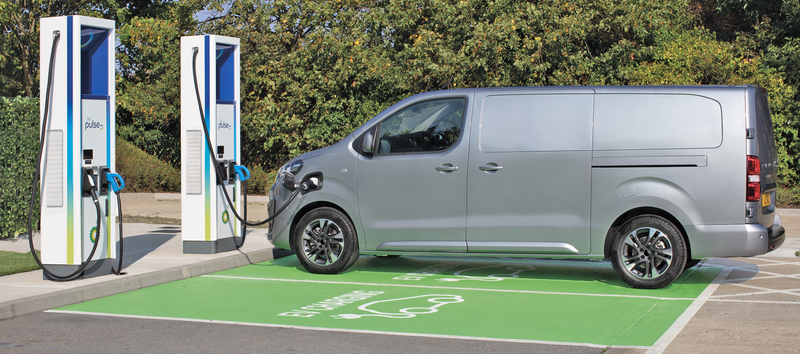
Public charging currently accounts for around 40% of all charging, says De Renzi, with 40% at homes and the remaining 20% in the workplace.
He expects this to change “quite significantly” as more light commercial vehicle (LCV) fleets electrify as this will mean more EVs are charged at depots.
“In 2025, for example, we believe something around 25% to 30% of energy will be dispensed at workplaces because the large fleets taking on electric LCVs will have significantly moved the dial,” says De Renzi.
BP Pulse offers fleets a range of charging solutions, including for home, workplace and public charging, and is currently developing new AC solutions for workplace charging which will be launched later this year.
“We see that different clients have very different needs,” says De Renzi.
“Today, drivers of ICE (internal combustion engine) vehicles have just one need: they need the pump with the nozzle and the cashier, but the demands for EVs are wider.
Matteo De Renzi
“For example, SMEs may rely on maybe a couple of AC chargers for their own parking places, but then it maybe becomes an on-the-go and home charge type of solution.”
In October last year, BP Pulse was awarded a contract worth up to £21m by Police Scotland to supply charging infrastructure across its estates, which will see 1,000 charging points installed at 265 locations in Scotland, including 35 ultra-fast chargers.
“This was a very complex deal in terms of execution because it’s a mix of infrastructure, but, equally, it’s the opportunity for a combined on-the-go charging solution where the fleet can roam and then charge across our network when needed.”
De Renzi says workplace charging can also benefit fleets as load balance optimisation can be lucrative, while vehicle-to-grid could optimise the overall value chain around energy.
“There is also an opportunity coming up with some large fleets that have a significant amount of estate and power available,” he says.
“They could, potentially, become partners in order to develop charging hubs for their own fleets, which they would use typically overnight, but then become hubs for the general public during the day.
“This is the type of flexible arrangement that will optimise the whole infrastructure.”
De Renzi on…interoperability
One of the common complaints among EV drivers has been they sometimes need four or five apps on their phone to ensure they are able to fully utilise the public charging network.
In 2019, the Government outlined an ambition that all new rapid charge points should provide debit or credit card payment, and BP Pulse reacted by pledging it would retrofit all its existing UK-made rapid chargers with contactless payment as well as introduce it on all new rapid and ultra-fast chargers.
“[Contactless payment], for me, is the most elegant way of offering roaming because you just need to have a bank card or an electronic digital wallet on your phones,” says De Renzi.
“This should really solve the interoperability issue and anxiety of having to deal with multiple cards or accounts in order to manage your needs.
“We also need to acknowledge that it’s economically unviable to fit credit card readers on all devices, particularly the AC chargers because it’s impossible to make the economics stack up.
“I read an interesting article that was saying that should the Government force adoption of credit card readers on all devices that will be the death of large public networks.
“We see a strategic value in exploring some partnerships with other players, which we are doing.
“I trust that combining two or three good and reliable networks is more than enough to guarantee to the drivers that level of confidence needed to take away range anxiety.”
Login to continue reading.
This article is premium content. To view, please register for free or sign in to read it.





















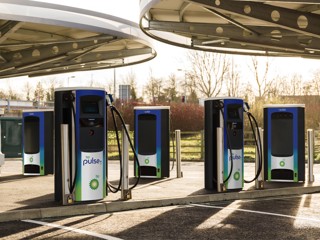
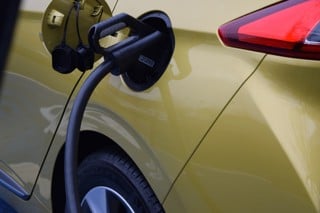
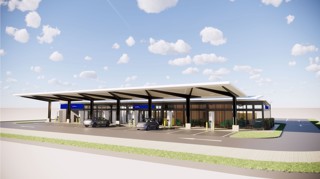
Login to comment
Comments
No comments have been made yet.